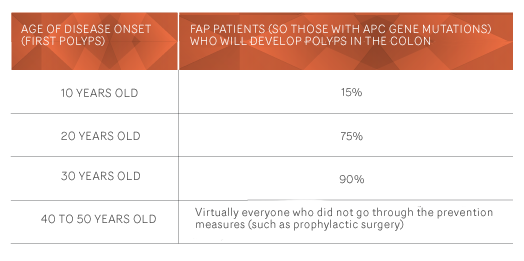FAP syndrome
The FAP syndrome account for less than 1% of all diagnosed colorectal cancers.
It is a syndrome with distinct characteristics and very high risk of cancer.
FAP patients develop high numbers (hundreds or even thousands) of polyps in the colon, so much so that this organ appears to be covered by a carpet of them.
The polyps tend to start developing around the age of 16, although they can appear from the ages of 7 to 36 (see table). Due to the high numbers of polyps, the risk that these benign tumors degenerate into cancer is extremely high, in fact, almost 100% of patients develop it.

It is estimated that FAP carriers develop colorectal cancer, on average, at the age of 40, unless adequate preventive measures are taken.
On top of a high risk of colorectal cancer, FAP-affected families can develop other types of cancer or health problems.
Patients with Gardner’s syndrome – a subtype of FAP – can have extra-colonic (in other places other than the colon) problems, such as sebaceous cysts, lipomas (benign tumor made of fat) or osteomas (a benign tumor made of bone)
FAP rarely skips a generation and is typically associated with polyposis (inumerous polyps development). However, about 25% of FAP cases are caused by de novo mutations – mutations that appeared for the first time in the affected individual so have not been inherited. This means that there will be no previous clinical or genetic evidence of the disease in the family.




